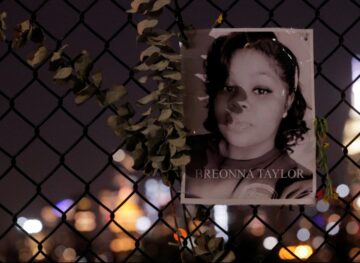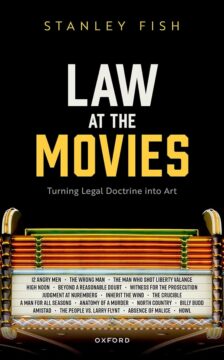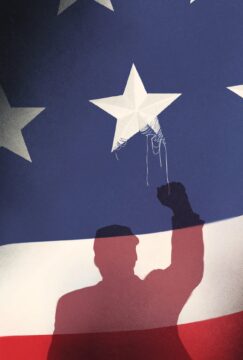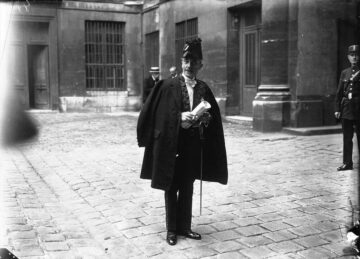Fintan O’Toole in the New York Times:
 In the novel, El Akkad disturbs his readers by projecting America’s present into a terrifying vision of what their familiar homeland might look like many decades hence. Here, he seeks to discomfit us by doing the opposite — asking us to look back on the present from an imagined future: “One day it will be considered unacceptable, in the polite liberal circles of the West, not to acknowledge all the innocent people killed in that long-ago unpleasantness. … One day the social currency of liberalism will accept as legal tender the suffering of those they previously smothered in silence.”
In the novel, El Akkad disturbs his readers by projecting America’s present into a terrifying vision of what their familiar homeland might look like many decades hence. Here, he seeks to discomfit us by doing the opposite — asking us to look back on the present from an imagined future: “One day it will be considered unacceptable, in the polite liberal circles of the West, not to acknowledge all the innocent people killed in that long-ago unpleasantness. … One day the social currency of liberalism will accept as legal tender the suffering of those they previously smothered in silence.”
Yet El Akkad himself is struggling against silence — not the taciturnity of indifference or cowardice but the near muteness imposed by the inadequacy of language in the face of mass obliteration. “One Day” reminded me of Samuel Beckett’s statement about having “no power to express … together with the obligation to express.” Whatever one thinks of its arguments, the book has the desperate vitality of a writer trying to wrench from mere words some adequate answer to his own question: “What is left to say but more dead, more dead?”
More here.
Enjoying the content on 3QD? Help keep us going by donating now.

 F
F “Today is a good day to arrest the cops who killed Breonna Taylor.” This phrase started as a call for the Kentucky Attorney General’s Office to hold accountable the officers that shot and killed the 26-year-old Louisville resident in her home in March 2020. In the months after Taylor’s killing, social media
“Today is a good day to arrest the cops who killed Breonna Taylor.” This phrase started as a call for the Kentucky Attorney General’s Office to hold accountable the officers that shot and killed the 26-year-old Louisville resident in her home in March 2020. In the months after Taylor’s killing, social media  Feisty contrarian Stanley Fish has served us for decades as the public intellectual people love to hate. Feminist social critic Camille Paglia famously
Feisty contrarian Stanley Fish has served us for decades as the public intellectual people love to hate. Feminist social critic Camille Paglia famously 
 Conflict theory is the belief that political disagreements come from material conflict. So for example, if rich people support capitalism, and poor people support socialism, this isn’t because one side doesn’t understand economics. It’s because rich people correctly believe capitalism is good for the rich, and poor people correctly believe socialism is good for the poor. Or if white people are racist, it’s not because they have some kind of mistaken stereotypes that need to be corrected – it’s because they correctly believe racism is good for white people.
Conflict theory is the belief that political disagreements come from material conflict. So for example, if rich people support capitalism, and poor people support socialism, this isn’t because one side doesn’t understand economics. It’s because rich people correctly believe capitalism is good for the rich, and poor people correctly believe socialism is good for the poor. Or if white people are racist, it’s not because they have some kind of mistaken stereotypes that need to be corrected – it’s because they correctly believe racism is good for white people. If the number of on-camera screams is any indication, Kim Kardashian’s first encounter with
If the number of on-camera screams is any indication, Kim Kardashian’s first encounter with  Before 2014, the call to “stay woke” was, for many people, unheard of. The idea behind it was common within Black communities at that point — the notion that staying “woke” and alert to the deceptions of other people was a basic survival tactic. But in 2014, following
Before 2014, the call to “stay woke” was, for many people, unheard of. The idea behind it was common within Black communities at that point — the notion that staying “woke” and alert to the deceptions of other people was a basic survival tactic. But in 2014, following  I left private equity to work on shrimp welfare. When I tell anyone this, they usually think I’ve lost my mind. I know the feeling — I’ve been there. When I first read Charity Entrepreneurship’s proposal for a shrimp welfare charity, I thought: “Effective altruists have gone mad — who cares about shrimp?”
I left private equity to work on shrimp welfare. When I tell anyone this, they usually think I’ve lost my mind. I know the feeling — I’ve been there. When I first read Charity Entrepreneurship’s proposal for a shrimp welfare charity, I thought: “Effective altruists have gone mad — who cares about shrimp?” I have been experimenting with the first of a new generation AI models, Claude 3.7 and Grok 3, for the last few days. Grok 3 is the first model that we know trained with an order of magnitude more computing power of GPT-4, and Claude includes new coding and reasoning capabilities, so they are not just interesting in their own right but also tell us something important about where AI is going.
I have been experimenting with the first of a new generation AI models, Claude 3.7 and Grok 3, for the last few days. Grok 3 is the first model that we know trained with an order of magnitude more computing power of GPT-4, and Claude includes new coding and reasoning capabilities, so they are not just interesting in their own right but also tell us something important about where AI is going. Donald Trump’s first election to the presidency in 2016 triggered an energetic defense of democracy from the American establishment. But his return to office has been met with striking indifference. Many of the politicians, pundits, media figures, and business leaders who viewed Trump as a threat to democracy eight years ago now treat those concerns as overblown—after all, democracy survived his first stint in office. In 2025, worrying about the fate of American democracy has become almost passé.
Donald Trump’s first election to the presidency in 2016 triggered an energetic defense of democracy from the American establishment. But his return to office has been met with striking indifference. Many of the politicians, pundits, media figures, and business leaders who viewed Trump as a threat to democracy eight years ago now treat those concerns as overblown—after all, democracy survived his first stint in office. In 2025, worrying about the fate of American democracy has become almost passé. Do you think women are more invested in romance than men? Rom-coms and women’s magazines may push this stereotype, but psychological research is increasingly telling a different story: multiple studies have suggested that men may actually place a greater importance on
Do you think women are more invested in romance than men? Rom-coms and women’s magazines may push this stereotype, but psychological research is increasingly telling a different story: multiple studies have suggested that men may actually place a greater importance on  Valéry said we see only through effort after we see for the first time. This is its own sort of trauma. We repeat the seashore of our youth until we die. Yeats did too, with his Irish myths and hopeless love for Maud, his Symbolist trappings and occult obsessions, and all the insecurities of the accomplished autodidact (he once failed to get a teaching job at Trinity College because he couldn’t spell “professor”), but there is a point when we realize art can take us further: It can let us see everything. It is the effort that changes utterly. Owen grasped this as well as Yeats.
Valéry said we see only through effort after we see for the first time. This is its own sort of trauma. We repeat the seashore of our youth until we die. Yeats did too, with his Irish myths and hopeless love for Maud, his Symbolist trappings and occult obsessions, and all the insecurities of the accomplished autodidact (he once failed to get a teaching job at Trinity College because he couldn’t spell “professor”), but there is a point when we realize art can take us further: It can let us see everything. It is the effort that changes utterly. Owen grasped this as well as Yeats. “The Edge of the Alphabet” is the third in a sequence of novels published after Frame left the hospital, following “
“The Edge of the Alphabet” is the third in a sequence of novels published after Frame left the hospital, following “